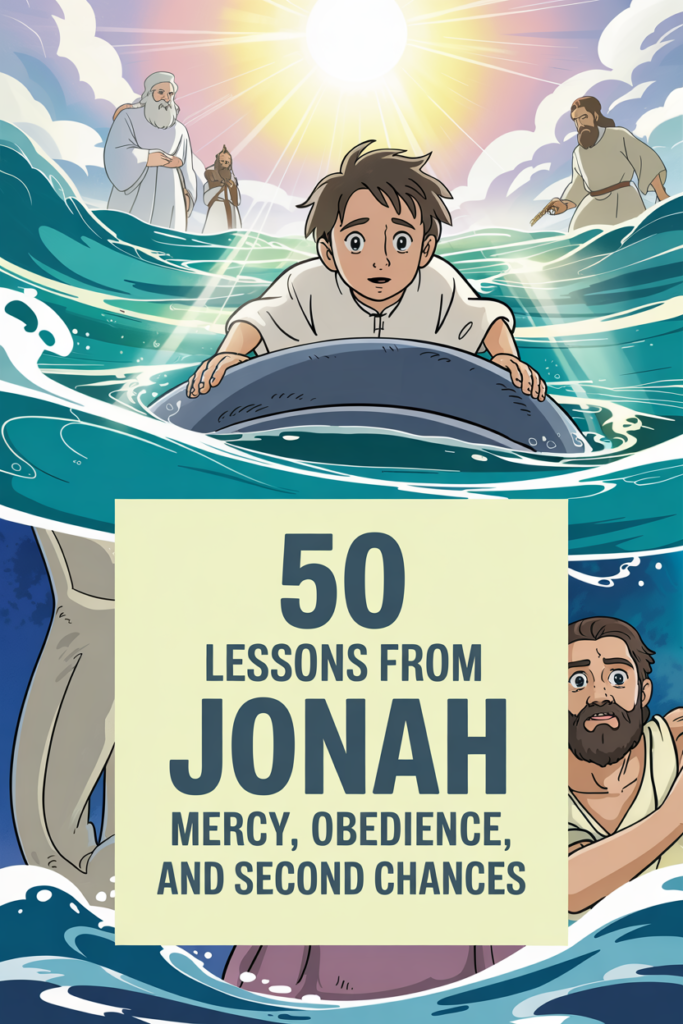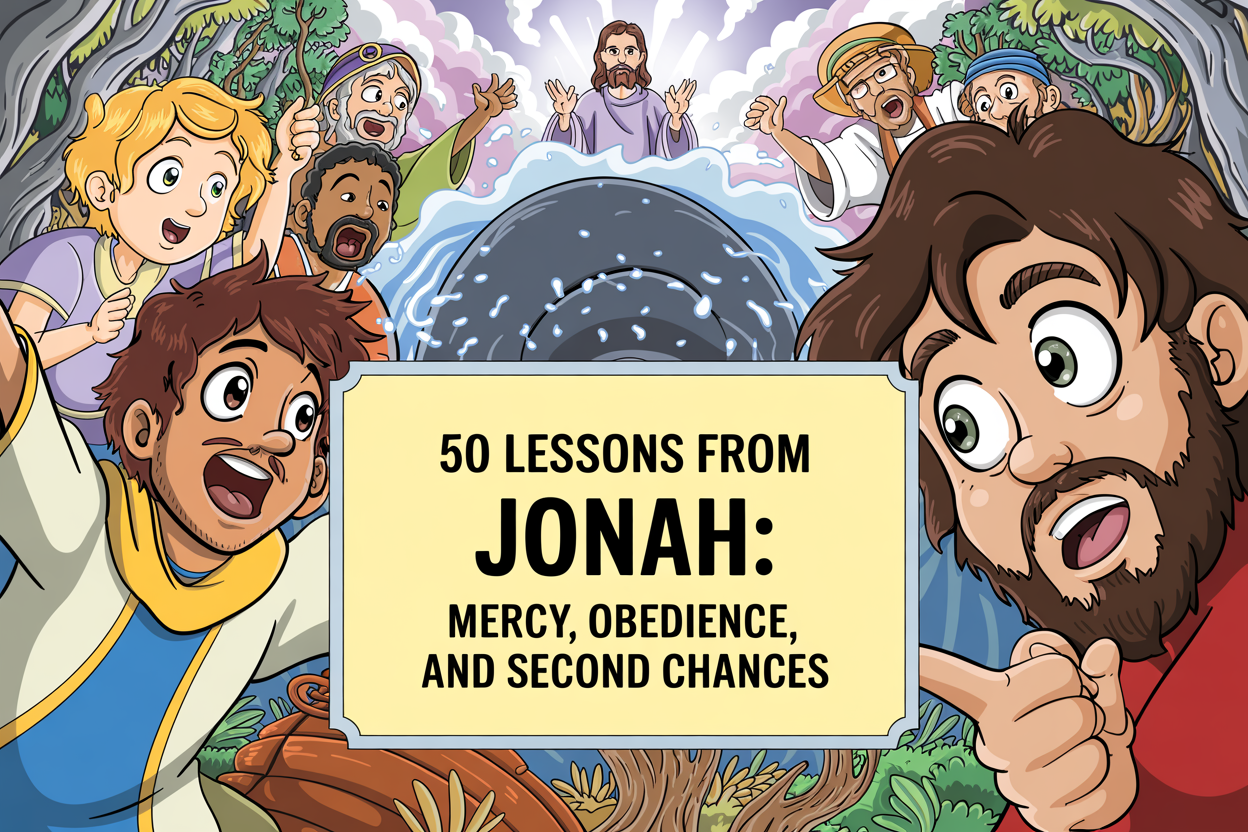Have you ever wanted to run the other way when God called? Jonah did too, only to discover that you can’t outrun a divine assignment. His strange adventure, storms, a giant fish, and a sulking prophet, holds powerful insights on obedience, mercy, and the grit it takes to align our hearts with God’s.
These fifty bite-sized truths unpack the highs and lows of Jonah’s journey so you can spot God’s hand in your own detours, embrace genuine repentance, and celebrate the second chances He graciously offers.

Jonah’s Prophetic Calling
- Jonah was chosen by God to deliver a message to the city of Nineveh (Jonah 1:2).
- God repeated His command to Jonah after his prayer to ensure the mission continued (Jonah 3:1).
- Jonah obeyed God’s instruction to go to Nineveh despite his initial reluctance (Jonah 3:3).
- Jonah’s prophetic message led an entire city to repentance (Jonah 3:5).
- Jonah’s calling shows that God often uses unlikely people to accomplish His purposes (Jonah 1:1).
God’s Sovereignty and Rescue
- God appointed a great fish to swallow Jonah and preserve his life (Jonah 1:17).
- The storm ceased immediately after Jonah was cast into the sea, demonstrating God’s control over creation (Jonah 1:15).
- Jonah recognized that salvation belongs to the Lord after his time in the fish (Jonah 2:9).
- God commanded the fish to cast Jonah onto dry land, illustrating His authority over all creatures (Jonah 2:10).
- Jonah’s rescue underlines that God’s mercy can save us from any circumstance (Jonah 2:9).
Repentance and Forgiveness
- The people of Nineveh fasted and put on sackcloth to show genuine repentance (Jonah 3:5).
- Nineveh’s king proclaimed a citywide fast and urged everyone to call mightily on God (Jonah 3:7).
- The people of Nineveh renounced their evil ways and violence in true humility (Jonah 3:8).
- God saw their repentance and chose to relent from sending calamity (Jonah 3:10).
- Nineveh’s example teaches that sincere repentance can avert judgment (Jonah 3:10).
God’s Mercy and Compassion
- God’s mercy toward the repentant Ninevites reveals His compassionate nature (Jonah 4:2).
- The Lord is gracious, slow to anger, and rich in mercy toward those who turn from sin (Jonah 4:2).
- God’s willingness to spare Nineveh demonstrates that no one is beyond His reach (Jonah 3:10).
- God granted Jonah a second chance to fulfill his calling, illustrating divine patience (Jonah 3:1).
- The story of Jonah shows that God delights in mercy more than judgment (Jonah 4:11).
Lessons in Compassion
- God asked Jonah if he was right to be angry in order to teach him compassion for sinners (Jonah 4:4).
- The sudden withering of the gourd plant reminded Jonah that God cares more for people than for plants (Jonah 4:7).
- God’s question about the plant and Nineveh highlights His deep concern for human souls (Jonah 4:11).
- Jonah’s story challenges us to develop God’s heart for the lost (Jonah 4:11).
- The contrast between Jonah’s pity for a plant and God’s pity for a city calls us to extend mercy (Jonah 4:11).
Typology and Christ
- Jesus described Jonah’s three days in the fish as a sign of His own burial and resurrection (Matthew 12:40).
- Jesus warned that the repentant Ninevites would rise in judgment over those who refuse His message (Matthew 12:41).
- Jesus said no greater sign would be given than the sign of Jonah, underscoring His authority (Matthew 16:4).
- Jonah’s deliverance from the fish prefigures the victory Christ secured over death (Matthew 12:40).
- The “sign of Jonah” points to the transformative power of Christ’s resurrection (Matthew 12:40).
Patterns and Symbolism
- The great fish represents God’s unconventional methods to fulfill His purposes (Jonah 1:17).
- Jonah’s descent into the fish symbolizes a form of death before experiencing new life (Jonah 2:1).
- The storm at sea illustrates the chaos that results from resisting God’s call (Jonah 1:4).
- The plant that shaded Jonah signifies God’s generous provision for His servant (Jonah 4:6).
- The worm that destroyed the plant highlights the fleeting nature of earthly comforts (Jonah 4:7).
Character Insights
- Jonah’s initial flight reveals the tension between personal bias and divine purpose (Jonah 1:3).
- Jonah’s honest confession to the sailors demonstrates humility amid failure (Jonah 1:12).
- Jonah’s prayer from the fish shows his reliance on God for deliverance (Jonah 2:2).
- Jonah’s anger over the withered plant exposes the sin of misplaced priorities (Jonah 4:1).
- Jonah’s ultimate obedience, though reluctant, fulfills God’s mission (Jonah 3:3).
Applications for Everyday Life
- Running from hard tasks only brings trouble, as Jonah experienced when he fled to Tarshish (Jonah 1:3).
- Even in dark seasons, prayer brings hope, as seen in Jonah’s cry from the fish (Jonah 2:1).
- True repentance opens the door to forgiveness, exemplified by Nineveh’s fast (Jonah 3:5).
- God cares for every soul, urging us to love beyond our comfort zones (Jonah 4:11).
- Trusting God’s timing can turn trials into testimonies, as seen in Jonah’s rescue (Jonah 2:10).
God’s Mission and Heart
- God’s commission to Jonah reflects His desire to extend grace to all nations (Jonah 1:2).
- The revival in Nineveh shows that God rejoices when sinners turn to Him (Jonah 3:10).
- Jonah’s reluctance reminds us that God’s plans may challenge our own preferences (Jonah 1:3).
- God’s conversation with Jonah about the plant illustrates His care for His servants (Jonah 4:10).
- God’s question to Jonah invites us to align our hearts with His compassionate mission (Jonah 4:11).
Affiliate Disclosure: "As an Amazon Associate I earn from qualifying purchases made from links in this post. We are a participant in the Amazon Services LLC Associates Program, an affiliate advertising program designed to provide a means for us to earn fees by linking to Amazon.com."

